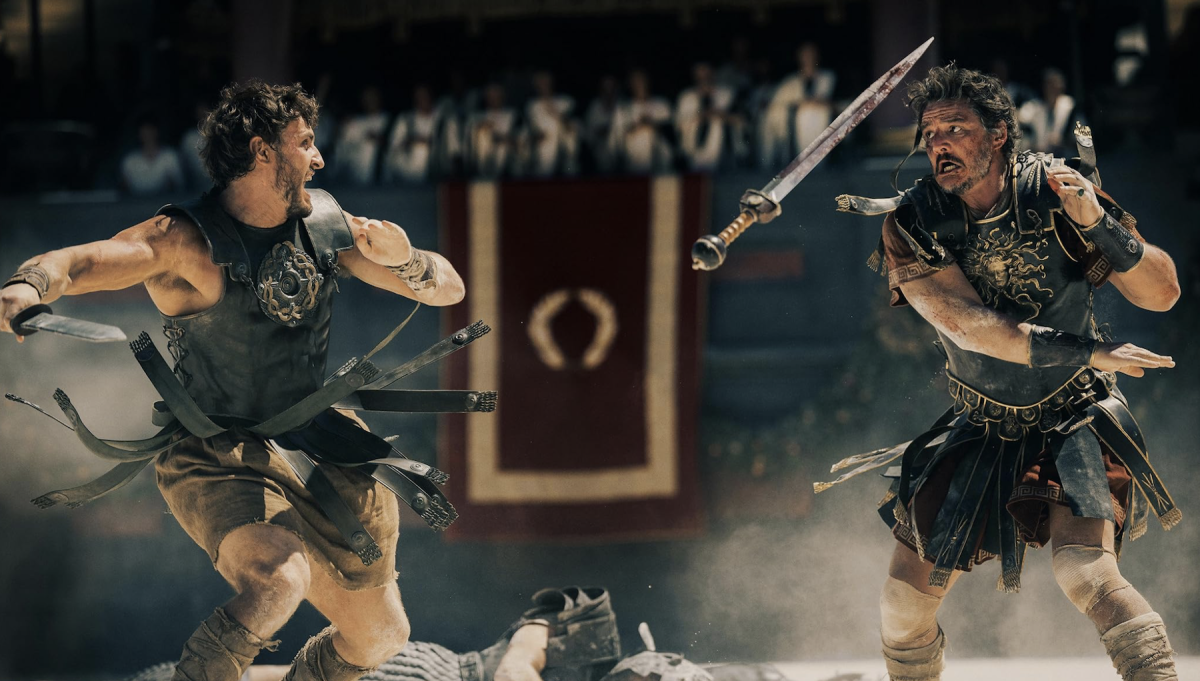Spoiler warning: This review contains spoilers for “Gladiator II.”
When I think of Paul Mescal’s filmography, one word sticks out to me more than anything: sadness. From running out of tissues during “Aftersun” to feeling completely empty after “All of Us Strangers,” Mescal is no stranger to pulling at your heartstrings — and he knows it. As one of the members of the “Tortured Man Club,” Mescal is known for his emotionally devastating characters that somehow always connect with audiences and make them feel what he feels.
After hearing that Mescal was going to star in Ridley Scott’s long-awaited sequel to “Gladiator,” I was excited to see a new side of him, and I can confidently say he proves his versatility as one of Hollywood’s new favorite leading men.
Mescal’s portrayal of Lucius — known as Hanno throughout the film — grabs you right from the beginning. After the Roman invasion of Numidia led by General Marcus Acacius (Pedro Pascal), Hanno is forced to return to Rome and take part in the city’s favorite pastime: fighting. He is chosen by Macrinus (Denzel Washington) to fight in the Colosseum, the biggest stage for gladiatorial combat.
In a specific scene in the movie, Macrinus explains how gladiators may be chosen, telling Hanno, “I choose rage.” It is abundantly clear that rage is a driving force for Hanno — during the Roman invasion, his wife Arishat (Yuval Gonen), the only family he had known, was killed. Macrinus promises Hanno that Acacius’ head will be served to him on a plate, and Mescal uses that rage to guide him through the film.
Scott’s portrayal of the relationship between Hanno and Acacius is perfectly executed — the development of Acacius’ character is carefully crafted and allows audiences to understand who he really is. Our introduction to Acacius is watching him lead his army to invade Numidia, leading us — like Hanno — to perceive him as the main antagonist. But as the film progresses, we understand that the orders came from the Roman Emperors Geta (Joseph Quinn) and Caracalla (Fred Hechinger) — the power-hungry, personality-clashing brothers.
One of the only original “Gladiator” characters to return, Lucilla (Connie Nielsen) wants to overthrow the empire. As the daughter of the former emperor and lover of the original film’s protagonist Maximus (Russell Crowe), she sent her child away out of fear for his life — who is later revealed to be Hanno.
Mescal, once again, uses his ability to communicate his every thought with viewers, and Pascal matches that energy. Their collaboration in the ring fills the screen and extends itself into the hearts of everyone watching, especially as Hanno understands where Acacius is coming from. I was happy for a solid two seconds, seeing that Hanno was able to put aside his personal rage to try and help the future of the empire. He saw that Acacius wasn’t the antagonist the film initially portrayed him as. However, this feeling is cut incredibly short after Acacius surrenders and the emperors order their staff to end Acacius’ life anyway: no mercy.
Throughout the film, everything is orchestrated by the main villain: Macrinus. Though he provides a lot of comedic relief, there is much more to his character. He is sneaky and conniving, and the audience understands that there must be more to what he is doing, even in the smaller moments, but compared to the emperors he doesn’t appear to be as bad. However, everyone ends up as a pawn in his game to get from the bottom to the very top, specifically Hanno. We come to learn that Macrinus was a slave and his life wasn’t always as extravagant as it appears to be. Washington’s performance proves, yet again, why he is considered one of the best actors of his generation. His deceit is subtle, yet he is having the time of his life playing this role, which works well with Macrinus’ character. I questioned his motives numerous times throughout the film, but he made it hard to dislike him, right up until the entire audience squirmed as he killed Emperor Caracalla. He almost gets away with it too — if it wasn’t for Hanno.
Though there are definitely moments of reflection or sadness in the film — like the film’s incredible use of flashbacks to the original “Gladiator” — “Gladiator II” is proof that Paul Mescal shines in genres other than dramas or romance films. He is capable of more than just melting one’s heartstrings: He can do as the Romans do and can fight for those roles too.
Contact Isabella D’Erasmo at [email protected].























































































































































